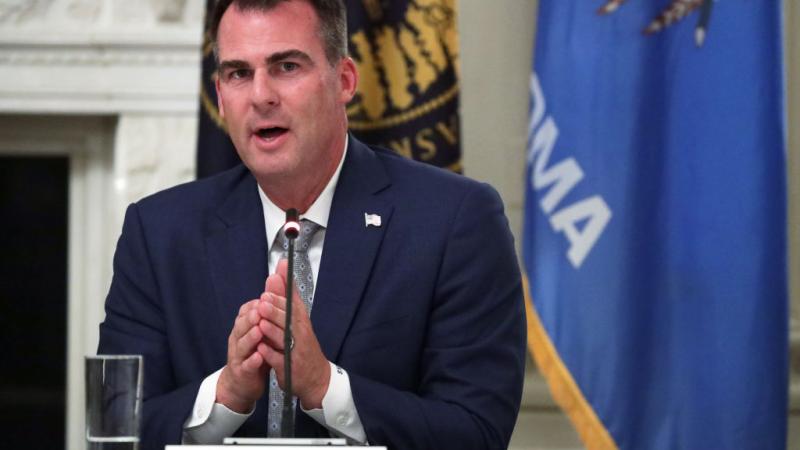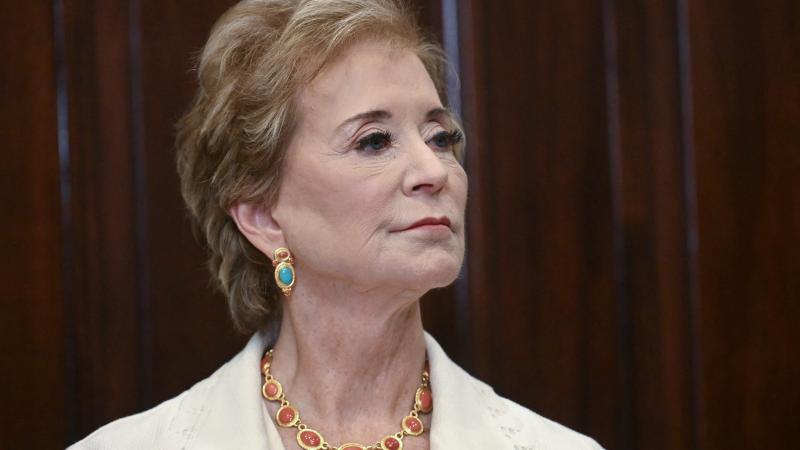College racial preferences harm race relations and free speech, groups tell Supreme Court
Recent episode where lawmaker exploded at civil rights commissioner for blaming Harvard for low number of Asian-American judges belies larger legal battle.
Rep. Ted Lieu, the California Democrat, believes the federal judiciary is overwhelmingly white because of racism, and he wants more Asian-American jurists to be nominated, including to the Supreme Court.
Peter Kirsanow, a member of the U.S. Commission on Civil Rights, agrees there should be more Asian Americans on the federal courts. But he blames Harvard University admissions policies, in part, for that shortage.
The difference of opinion has created some significant political theater, and foreshadows a larger legal battle before the nation's highest court.
Lieu, an Asian American, ripped into the black labor lawyer at a recent House Judiciary subcommittee hearing for saying Congress must consider "discrimination in the pipeline" at Harvard as an explanation for relatively few Asian Americans on the federal bench.
"Stop bringing in irrelevant issues," Lieu shouted at the lawyer when Kirsanow mentioned the legal brief he recently filed with his fellow commissioner, University of San Diego law professor Gail Heriot, at the Supreme Court.
Several friend-of-the-court briefs poured into the high court in the past week as it considers whether to revive a lawsuit against Harvard for its admissions practices. Last fall, a federal appeals court upheld dismissal of the litigation by Students for Fair Admissions (SFFA), which filed a petition for review in February.
The two civil rights commissioners, conservative scholars, "econometrics" researchers, a First Amendment group and the state of Texas are all supporting the plaintiff, which alleges that Harvard discriminates against Asian Americans including its unnamed student members.
SFFA wants the Supreme Court to overturn its 2003 Grutter ruling, the basis for Harvard's affirmative action policies, and scrutinize the university's refusal to seriously consider "workable race-neutral alternatives" to what SFFA calls "racial balancing."
Instead of promoting "the important goal of racial integration, race-preferential admissions policies have the perverse effect of promoting racial separation," Kirsanow and Heriot wrote, citing the increasing presence of racially separated student lounges, residence halls and graduation ceremonies.
"Put differently, race preferences are helping to cause the problem of racial separation rather than helping to solve it," their brief said.
Heriot was seen as a likely Trump administration pick to lead the Department of Education's Office for Civil Rights. She and Kirsanow have often teamed up to question the direction of the civil rights commission, whose members are appointed by the president and Congress.
The Trump administration supported SFFA's litigation and belatedly sued Yale University on similar grounds, a move quickly reversed by the Biden administration.
Asian immigrant judge: 'it would be especially wrong to select judges based on race'
Kirsanow upset Lieu at the hearing by connecting the underrepresentation of Asian Americans in the federal judiciary to the Ivy League's "profound discrimination" against them in admissions, given how many judges come from Ivy League schools.
"There are more Asian Americans at these Ivy Leagues," the lawmaker shouted when Kirsanow mentioned his Supreme Court brief. "These are different issues happening."
Trust in American institutions is falling, however, precisely because of "the perception that decisions are being made on the basis of race" in college admissions and other settings, Kirsanow said.
A Taiwan-born federal judge who testified at the hearing, James Ho, said a college admissions advisor told him his "grades, SAT scores, and activities were all strong enough to get me into my top choice of schools—if I wasn't Asian."
He warned that "it would be especially wrong to select judges based on race" instead of merits.
Ho is the only Asian American and immigrant on the 5th U.S. Circuit Court of Appeals, but he would "never suggest that a wise Asian would, more often than not, reach a better conclusion than a white judge." That assumption is "poisonous to civil society," he said.
The friend-of-the-court brief by Kirsanow and Heriot focused on what it said was false assumptions made by the Supreme Court in blessing racial preferences in admissions.
Racial preferences are not motivated by "concern for pedagogy" but rather "a belief that a debt is owed to an entire race as compensation for past wrongs," a rationale that the high court specifically rejected, their brief argues.
The only reason for racial preferences at elite universities is because the black and Hispanic students who are admitted, while "very talented," still have lower academic qualifications than white and Asian applicants, the brief said.
This substantially explains the "racial separatism" that has developed on campus, as students look for a "niche ... that does not require academic competitiveness," the two argued. The brief quotes from a forthcoming collection of essays edited by Heriot, in which Kirsanow recounts joining a black-only dorm at Cornell University whose residents he said had "greater insularity" than other black students and a "vague sense of militancy."
The National Association of Scholars also argued that affirmative action has not produced the "cross-cultural intellectual stimulation" and racial reconciliation that the court envisioned, but rather "neo-segregation." The group cited its 2019 study of racially separated facilities and activities at more than 170 colleges.
Black students at elite schools also tend to choose different majors than white peers, or switch to a "less demanding" field of study at much higher rates, the brief argued. By contrast, blacks are likely to excel and contribute to "genuine diversity" at colleges that are "somewhat less competitive," it added.
Admitted minorities are economically similar to their Harvard classmates, the group said. The university's admissions data shows 70 percent of its racially “underrepresented" students are "privileged" by its own definition, meaning race preferences are being used to strengthen "the dominant upper middle class culture" on campus.
These underrepresented students are largely taking slots away from Asian-American applicants instead of whites, a much larger population, showing that "admissions officers may ironically fall victim to implicit racial bias against Asians," according to the brief.
George Mason University law professor David Bernstein, who wrote a forthcoming law review article on "The Modern American Law of Race," highlighted what he called an overlooked issue in race-conscious admissions: how colleges created racial categories.
"Harvard cannot explain why roughly 60% of the world’s population should be grouped together as 'Asian,' despite vast differences in appearance, language, and culture," while grouping together "a white European from Spain" and a person with South American ancestry.
Bernstein also faulted Harvard's use of "racial self-identification" to award preferences. Such systems are vulnerable to "fraudulent and exaggerated claims of minority ancestry, confusion about how to self-identify, and inconsistent classification of multiracial applicants."
Brown University's Glenn Loury, who often writes on race, joined a brief with eight other economists from Caltech, the University of Pennsylvania and University of Notre Dame among others.
They were able to peek "under the hood" of Harvard's admissions process due to the reams of evidence that were produced in the lawsuit. The economists built "logistical regression models" that let them control for more than 200 applicant characteristics and single out the effect of race in admissions.
"Harvard's overall ratings are inexplicable without racial discrimination," the brief said: "The coefficients are precisely the opposite of what one would expect based on other observable data," under which Asian Americans should do better than whites, while blacks and Hispanics should do worse than others. The so-called tip for blacks is "very large," they argued.
Using "observable data," Asian Americans should also outperform other racial groups on Harvard's "personal rating," the university's most subjective measure. Yet they fall below whites and especially blacks and Hispanics.
Without considering race, Asian Americans would have a 21 percent better chance of receiving a personal rating that virtually guarantees admission, while blacks would have a 21 percent worse chance, the brief said.
Texas Attorney General Ken Paxton launched a full-bore attack on the Grutter ruling in his brief. He called it "an unprincipled departure" from Supreme Court precedent that allows racial classifications only in the absence of race-neutral alternatives, and then, only when they serve a "compelling state function."
Ever since the high court's 2016 reaffirmation of race preferences, most black and Hispanic students admitted to the University of Texas came through the state's race-neutral law that automatically admits the top 10 percent of each high school class, the brief said.
Asian-American enrollment increases are also traced to the law, according to Paxton: "Almost two decades of racial discrimination [since the 2003 ruling] have garnered the University of Texas nothing, while disadvantaging countless young adults based on the color of their skin," his brief argued.
Higher education is the "only context" in which the court has allowed a party accused of discrimination to "determine whether discrimination is necessary," the brief said. The ruling, which created the category of "benign" discrimination, is so far off base that the Supreme Court has since rejected its application to elementary and secondary schools, it added.
Speech First, which ordinarily files lawsuits against university speech codes and bias response teams, found First Amendment implications in the Grutter ruling.
Contrary to the Supreme Court's view that racial preferences can promote the "robust exchange of ideas," its brief said, "reality has disproved the theory: Student speech has come under assault in recent decades."
The ruling not only violated First Amendment norms by accepting non-neutral treatment of applicants, but it had to defer to the representations of universities in order to find a compelling interest, Speech First said.
"Indeed, defenders of preference have claimed it is nearly impossible" to find evidence that affirmative action improves the intellectual environment of campus. "They also typically describe the benefits of diversity in terms of outcomes" instead of their rationale's speech-based theory.
Studies in recent years have shown students increasingly holding their tongue "on sensitive topics, lest they be accused of violating a speech code" or triggering a bias investigation, the brief said. "The campus climate is affirmatively hostile to controversial ideas that could be deemed 'offensive.'"
















